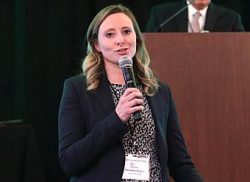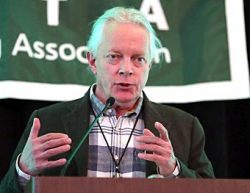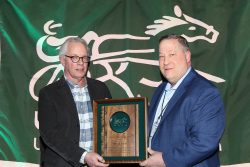Columbus, OH — With the USTA Executive Committee Meeting canceled, USTA Chairman of the Board of Directors Joe Faraldo kicked off the second day of the annual meetings with the General Opening Session on Saturday (March 12) at 10:30 a.m.
After the Pledge of Allegiance and the roll call, Faraldo acknowledged new directors from 2020 and 2021, when the annual meetings were held via Zoom, then introduced Steve Bateson and Dr. Scott Woogen as new directors for 2022.

In a change of the agenda, Amanda Bunning Kelsey and Brandi Lowell from The Ingram Group, the USTA’s lobbying firm, introduced themselves and acknowledged the other members of their team to the directors. Kelsey gave a detailed discussion of their Congressional lobby efforts on the Horseracing Integrity and Safety Act (HISA) and the Save America’s Forgotten Equines Act (SAFE).
Lowell presented a Washington legislative update discussing must pass legislation before Congress and the midterm elections and critical issues involved.
Next USTA President Russell Williams and Chairman Faraldo gave their annual reports.
Williams discussed his letter to the NY, NJ and PA racing commissions recommending investigations into the results of the private drug testing conducted by Meadowlands owner Jeff Gural. In those letters, Williams called for the results of the tests to be revealed to the commissions. He then discussed the HISA law and indicated that the USTA has prepared alternate, constitutional legislation based upon federal oversight and state administration that is ready to be submitted to Congress in the event either or both of the two federal lawsuits challenging the constitutionality of the law are successful.

Williams informed the directors that the Internal Revenue Service has declared that a prominent Standardbred breeding farm has been designated as a hobby, not a business.
He concluded by giving kudos to the USTA staff, calling them “the best staff in all of racing.”
Faraldo echoed Williams’ comments about USTA staff. He promised that the Marketing and Communications Committee and USTA staff would work together to create an effective HarnessRacing.com website in cooperation with the recently established Electronic Marketing Committee.
Next, the chairman urged the directors and the industry to support the Standardbred Racing Investigative Fund and the Standardbred Transition Alliance. Citing that Dr. Bridgette Jablonsky, the executive vice president of Hanover Shoe Farms, established a $250,000 matching fund donation to SRIF, Faraldo was critical that, while many in the industry have been vocal on integrity issues, the Standardbred Owners Association of New York and the Pennsylvania Harness Horsemen’s Association were the only two organizations in the industry to donate to the fund.
“Others in the industry have to put their money where their mouth is,” said Faraldo. “It (SRIF) has to be independent. There are ongoing investigations and are farmed out to state and federal enforcement agencies.”
Faraldo reminded the directors that when the STA was formed, the USTA provided it with seed money to get established and that others in the industry need to support it.
“People in our sport need to reach into their pockets to do what is needed to do,” said Faraldo. “People in our sport have to support the important things in our game, and I don’t see it. I have to apologize for saying these things, but they need to be said.”
Next Faraldo conducted the elections of officers where all were unopposed and approved by the board. The officers elected were Chairman Joe Faraldo, Vice Chairman Mark Loewe, Treasurer Jim Miller, and Corporate Secretary Michele Kopiec.
In his Executive Vice President Report, Mike Tanner discussed three items.
He indicated that the USTA will make the creation of an Equine Injury and Fatality Database a priority over the next two years.
Second, in discussing Ashley Tetrick’s proposal for HarnessRacing.com, presented Friday (March 11) evening, Tanner had philosophical questions.
“What should our current website be?” asked Tanner. “Who are we serving? And what do we do when our constituencies have conflicting ideas? We need to establish priorities going forward instead of on a case-by-case basis.”
Finally, regarding SRIF, Tanner indicated that the USTA has sent cases to their Oversight Committee and is considering the creation of a new position at the USTA to coordinate with SRIF.
“We’ve turned over five or six cases that we thought needed to be pursued with evidence,” said Tanner. “We are considering the creation of a position for someone who can serve as the point person at the USTA that can be in contact with SRIF (Oversight Committee), the tracks and racing commissions.”
USTA Controller Dennis Fisher gave his annual presentation on the organization’s financials and budget.
The second sub-committee presentation on the STA was given by their administrator Jennifer Daniels. She discussed the procedures for the accreditation process, grant management, the new Placement Liaison Program and the intake, horse information and vet forms involved.
The final presentation was a repeat of the HarnessRacing.com proposal made in the Marketing and Communications Committee from Ashley Tetrick the night before.

After the break from the morning session at the Recognition Luncheon, Williams made a presentation of the President’s Award to STA President David Reid. He also presented 20 years of service awards to directors Jacqueline Ingrassia, Dr. John Mossbarger and in absentia to Jay Cross.
After lunch, the Racing, Registration, and Finance Committees held their meetings.
Chairman Mark Loewe conducted the Racing Committee meeting which included Regulatory, Fairs, Pari-Mutuel, and Driver/Committee updates.
In the Regulatory Committee, USTA COO TC Lane gave an update on the Officials Internship Program. In the Pari-Mutuel Committee Michael Carter provided an update on the Strategic Wagering program and Chairman Loewe discussed accident protocols and the necessity to establish uniformity for the safety of all drivers and horses. Ohio is currently coming up with extensive protocol that may be a model for other tracks/jurisdictions.
The committee also considered and voted on 23 rule change and three by law proposals for recommendation to the Rules Committee for their meeting on Sunday (March 13), who will then pass on their recommendations to the full board.
Mike McNeely, VanGundy Insurance Agency, gave an in-depth overview of the disability income program with accidental death and dismemberment written by VanGundy, underwritten by Chubb insurance. There are no rate changes for 2022.
In the Registration Committee, Lane gave a 2021 summary report indicating trends in registrations. Then there were two presentations made from off site. Rebecca Bellone, Ph.D., from the University of California-Davis gave an update on equine genetics and genomics and Dr. Kevin Corley discussed and presented a video update on the EquiTrace app for microchips.
The USTA’s Outreach and Membership Enrichment Coordinator Jessica Schroeder explained the new Standardbred Incentive Program and discussed some of the organization’s other outreach programs.
In Kevin Greenfield’s Syndicate Management presentation, he recommended that the USTA change its rules including separating breeding syndicates from racing syndicates. At the direction of Chairman Mossbarger and President Williams, a new committee to be chaired by Greenfield will be taking a deeper look into the structure and roles of the existing stallion syndicates. Additional members will be named shortly.
President Williams led a discussion of whether the USTA should consider budgeting for an amicus brief in the case involving the IRS ruling that breeding farms are a hobby, not a business. It was decided not to pursue it at this time.
Chairman Loewe made a motion to add five dollars to transfer fees to fund the STA, which was approved by the committee for recommendation to the full board.
The afternoon session concluded with Fisher and Tanner joining the Vice Chairman of the Finance Committee Don Marean to discuss the audited statements, investment committee actions and 2022 budget. David Siegel made a motion to amend the budget to include salary and expenses for hiring for the position of USTA liaison with SRIF that was approved. With only that addition, the committee approved the budget for recommendation to the full board.
